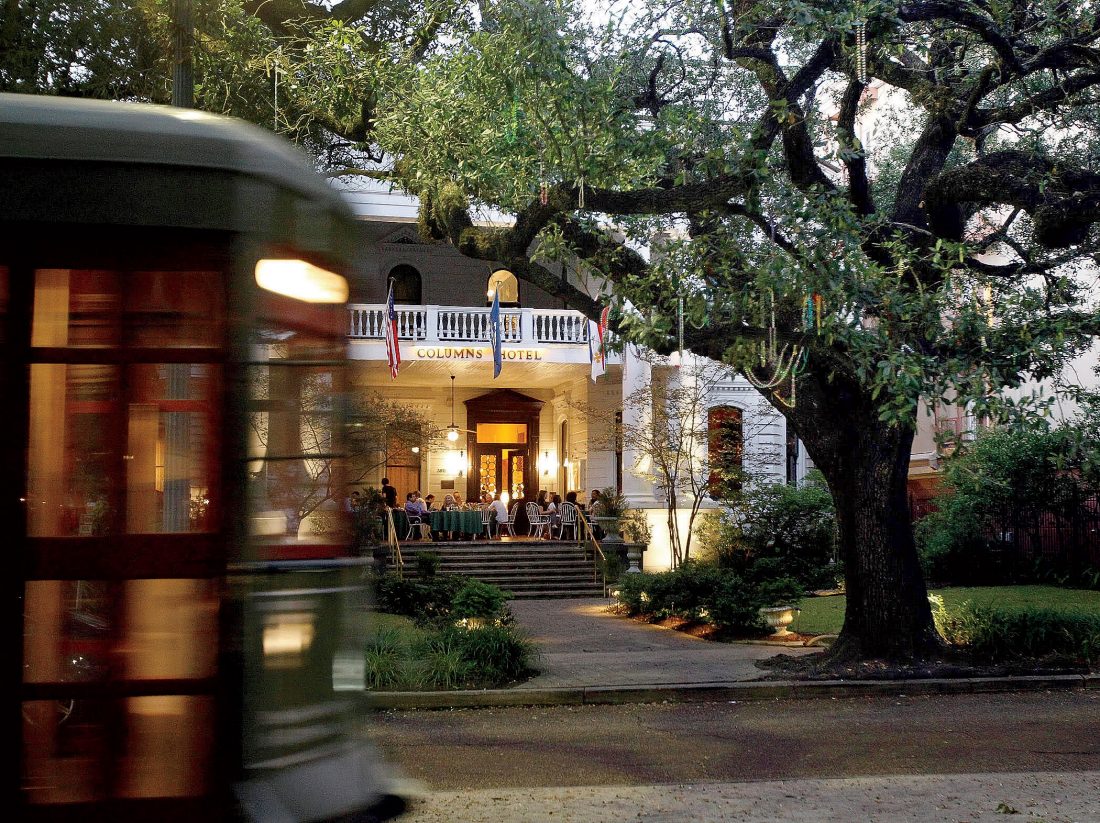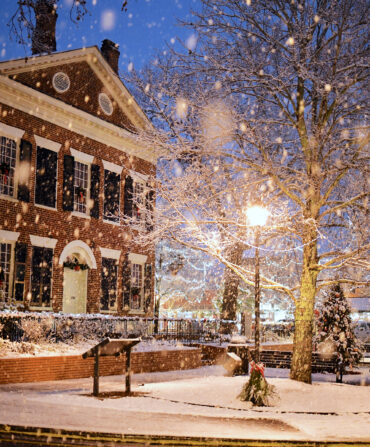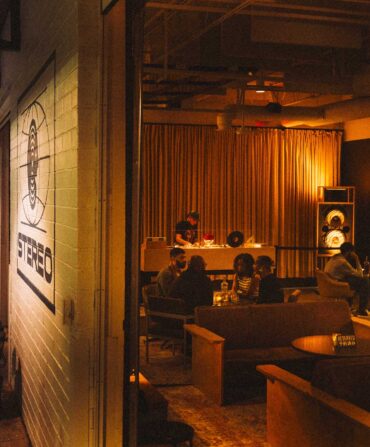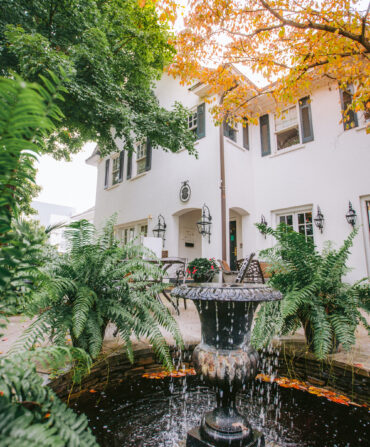The older I get, the longer I am gone from it, the New Orleans I experienced as a young man seems more and more like a mirage, a shimmering, half-remembered thing, conjured not from shifting sands and searing heat but from humidity and hangover. Maybe nothing really looks the same, once the haze of dark rum or brown whiskey has burned off. I don’t know. But the very best of it, the finest moment that I remember, happened in a hotel in which I never spent a night, never turned a key. It began, as I recall, at the bottom of a flight of dark, creaking steps, with loud laughter at my back and the sugary smell of Southern Comfort and candied cherries swirling thick around my head. The steps led, however improbably, into the very branches of the live oaks, into the air itself. And there, in the ancient trees that line lovely St. Charles Avenue, hung a strand of pearls. But that might just be the whiskey talkin’.
It could have happened anywhere, that perfect New Orleans moment.
I guess it should have happened at the Pontchartrain. I first came to this old city three decades ago, fell in love with it, and when I could not come up with a good reason to be here I came anyway, ultimately taking up a kind of semipermanent residence in this historic hotel safely away from the drunken swill and ballyhoo of the French Quarter. The bellmen kept some of my luggage in a lobby closet; I was seldom gone more than a couple of weeks, and knew that, unless I died from boredom in some gleaming metropolis of the modern South, I would come back to this city within weeks if not days.
You had to see the Pontchartrain back then, see its frayed elegance and run your fingers over its gilded rot, to love it. It eventually faded out of business, and the Bayou Bar went dry, and the piano man…well, I don’t know what happened to him. I hear it may reopen this year, the Pontch, but that piano man had some age on him, and so much time has passed, and…and so it will sound different this time.
There were a lot of perfect moments in the Pontch, but not the one.
I always thought, in perhaps the best eating city in this world, that the perfect moment would come on a plate, smelling of butter and onions and garlic and cayenne, or on the half shell, or maybe as a snowball in a paper cup.
Perhaps the immaculate moment would come on a little square of cornbread from Upperline. Or maybe I would spoon it out of the bread pudding soufflé at Commander’s Palace, or find it inside an oyster po’boy at Domilise’s, or under the ham shank at Betsy’s Pancake House on Canal.
No. Surely, then, it would come at a place like the one Celestine Dunbar ran on Freret Street, before its walls vanished under a liquid nightmare. The best fried chicken and red beans I can recall, the best stewed cabbage. People who think a vinyl tablecloth cannot be elegant never sat at her table. But as good and tragic as its story was, it was not the moment, not the place.
Maybe, then, it was in the music. I watched Rosie Ledet mash her squeeze box and make the entire clientele of the Rock ‘n’ Bowl break into a cold sweat. Or maybe it would come not on a stage at all but on Royal Street, in the hot sunshine, watching a young man in a battered felt hat sing Sam Cooke for pocket change. Maybe.
I loved the place so much I even owned a house here, once, there at the corner of Joseph and Annunciation Street, Uptown. I have said this before, but there is something remarkable about waking up here. I would swing my feet from under the covers and, as my feet touched the hardwood floors of my shotgun double, I felt…well, I can’t really explain. Like I could eat anything, drink anything, fight anyone, and get clean away with it. But life took me away. I still drive by there, and think of the good times, and wish I had stayed a quarter century instead of three scant years.
I’m just a tourist now. But once, I felt like something more.
My moment came years before I ever owned even a teaspoon of the city. It was in the nineties, in a time when the crime rate was so remarkable, so achingly high, that it became its own culture. The wounded city, long before Katrina, staggered and danced back from that grave, too. It always does.
At the end of one bad day, I made plans to meet friends at the Columns Hotel on St. Charles, to have a snort of whiskey. But the place was jammed with after-work drinkers; it was like God opened up the courthouses and emptied every human with a good haircut and a Brooks Brothers charge card into this one hotel bar in one instant.
The Columns is a three-story mansion, named for the massive columns in front, with a big front porch that I think rich people probably call a portico, but I have long since tired of trying to make them think I’m smart. The porch, too, was crowded, teeming. It is one of the things that set New Orleans apart. No matter how long or rotten your day, people will stand in tight shoes and high heels for two more hours, to bend an elbow with friends, and tell stories, and celebrate the very process of standing around and breathing air. It does not have to be Carnival. It can be the day the water bill comes.
But I needed a cove, a lee, a place away from the storm. On the second floor of the Columns is a balcony that rises above it all, a space reserved for the people who rent rooms at the hotel. But, somehow, we talked our way past the guardians of the stairwell and made our way up the groaning steps. I do not believe a bribe was ever even mentioned; I was willing to go as high as a twenty, for a quiet place to stare into a glass.
It was more than that.
I sank into a chair, into soft cushions. I cannot recall a word of what was said, only just being there. The live oaks swayed and creaked, up and down the avenue. I remember feeling the way I felt when I was a child, in the tree houses my big brother made. We fought Indians from there, repelled pirates. There’s something safe and good about being up high.
You could hear the party downstairs, but muffled; you could smell the perfume, and the candied cherries and orange slices and lemon wedges, and cutting through everything the smell of whiskey and beer. But like the noise it was subdued, more like a memory of a thing, a ghost of it, and then the breeze took it away and replaced it with flowers.
I don’t want to make too much of it; it was not profound, just peaceful. I don’t think I’ve written that line much in my life. And then the streetcar, the clanking, whirring, beautiful, antiquated, inefficient, irreplaceable streetcar, broke through the settling dusk and the prevailing peace like a beloved, drunken, lurching uncle, and it just made things better somehow, because what is more New Orleans than that? The lights inside showed tourists, and tired ladies coming home from work, and young mothers battling with their children, and if I had not been so jaded I would have waved. I should have waved.
It left us there in the dusk, but there would be another, after a while, and another. It was then that I noticed the strand of white beads in the branches. During Carnival they call the big white strands “pearls,” just plastic junk, but priceless in one fleeting second in time. The parades run right by here and I imagined some reveler in exuberance had flung them there.
I do not even know why I noticed. I had seen such a thing a hundred times. I guess it was just the moment. I am sure they have long since fallen to the sidewalk by now, onto the median, what the people here call the neutral ground. But it is nice to think they will sway there forever.
I do not think I lingered very long. But I will never forget those minutes there. It was as if someone had taken so much of what is lovely and unique about this place and just hung it on the thick, wet air, to be admired. It was just a moment, fine in itself. Most people have stories of New Orleans, brighter, louder, richer, raunchier, maybe even better.
I have not gone back to the balcony. But I think about it every time I ride down this beautiful avenue, in this great city, every time I see the tired ladies rumbling home from work on that steel streetcar, every time I glance overhead, to the trees, and see the broken and ragged jewels dangling above.
As I said, most people have a good bit more fun here than this.
I must be getting old.








